In the bustling streets of London, electric vehicles are becoming an increasingly common sight. With the UK’s ambitious plan to ban the sale of new petrol and diesel cars by 2030, the shift toward electric mobility is accelerating faster than ever. For Londoners thinking about making the switch to an EV, one question looms large: how much does it cost to install an EV charging station at home?
The short answer: installing an EV charging station in London typically costs between £500 and £1,500, depending on various factors. But as with most things in life, the devil is in the details!
As someone who’s helped countless London homeowners navigate this exact transition, I’m here to break down everything you need to know about EV charging station installation costs. Let’s plug in and power up your knowledge!
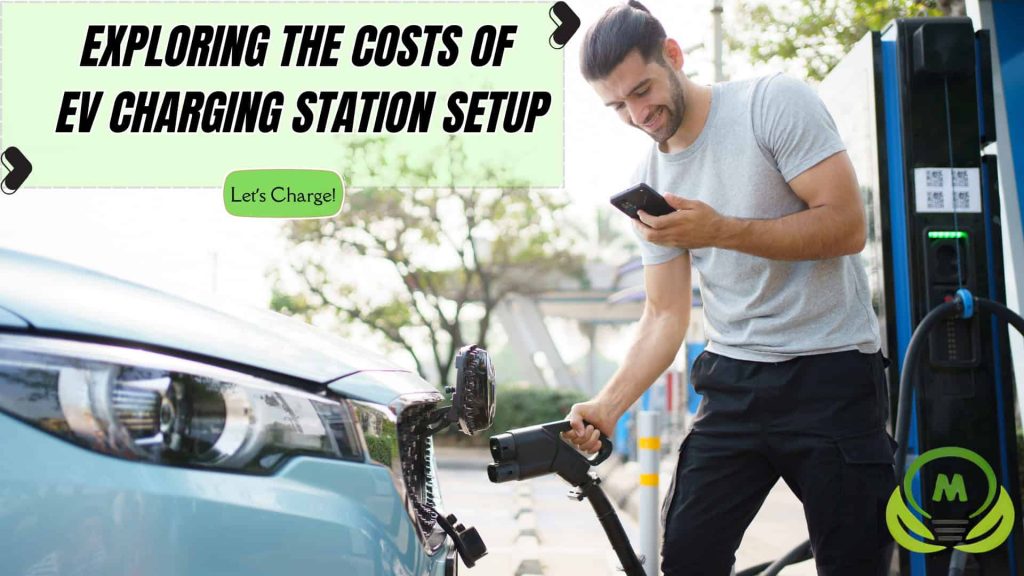
Man connecting EV charger for an electric car at home
Basics of EV Charging in London
Before we dive into the costs, it’s important to understand what exactly we’re talking about when we discuss EV charging stations.
What Is an Electric Vehicle Charging Station?
An EV charging station, also called a charge point or electric vehicle charging point, is a piece of equipment that supplies electrical power to charge your electric vehicle. Unlike conventional vehicles that require petrol or diesel, EVs need electricity to recharge their batteries.
The charging process is remarkably simple: you connect your EV to the charging station using a charging cable, and electricity flows from your home’s electrical system into your car’s battery. The energy prices for charging at home are significantly lower than public charging rates, making home charging an economical choice for EV owners.
Best EV chargers for London homes
When it comes to EV chargers, not all are created equal. Here are the main types you’ll encounter:
- Level 1 Chargers (3 kW): These are the most basic option, typically costing £250-£500 for the unit alone. They’re essentially upgraded versions of a standard home socket and charge at about 3 kW. While they’re the cheapest option, they’re also the slowest, taking 8-12 hours to fully charge most EVs.
- Level 2 Chargers (7 kW): These are the most popular option for home installation in London, costing £450-£800 for the unit. They provide faster charging (typically 3-4 hours for a full charge) and are ideal for overnight charging.
- Rapid Chargers (22kW+): These high-powered units are mostly found in public charging stations rather than homes, as they require special electrical setups that most UK households don’t have. Converting your home to support a rapid charger can cost upwards of £3,000, with some installations exceeding £15,000!
| Charger Type | Power Output | Cost of Unit | Installation Cost | Charging Time (Typical EV) | Ideal For |
| 3kW Charger | 3 kW | £250–£500 | £400–£600 | 8–12 hours | Small EVs, occasional drivers |
| 7 kW Charger | 7 kW | £450–£800 | £400–£600 | 4–6 hours | Most London homeowners with off-street parking |
| 22 kW Charger | 22 kW | £1,000–£2,000 | £3,000 – £15,000 | 1–2 hours | Commercial properties or homes with high-capacity electrical systems |
Benefits of Installing an Electric Car Charger
Having your own electric car charging point at home offers several advantages:
- Convenience: No more hunting for public charging stations or waiting in queues
- Cost Savings: Charging at home is significantly cheaper than public charging points
- Speed: A dedicated home charger is much faster than using a standard plug socket
- Added Property Value: As EVs become more common, having a charging point installed may increase your property’s appeal to future buyers
Cost Breakdown of Installing an Electric Car Charger
Now, let’s get to the heart of the matter: what will it actually cost of EV charger installation in London?
Equipment Costs for Home EV Charger
The first component of your total cost is the charger itself:
- 3kW Charger: £250-£500
- 7kW Charger: £450-£800
- Smart Home Chargers: £900-£1,100
Smart home chargers offer additional features like WiFi connectivity, scheduling capabilities, and smartphone app control. While they cost more upfront, they can help you save money in the long run by automatically charging during off-peak hours when electricity rates are lower.
Some popular brands of EV chargers include Pod Point, Rolec, and Ohme, each offering different features and price points. The Pod Point Solo 3 charger, for example, costs around £798 including installation.
Charger Installation Fees
Beyond the cost of the charging unit itself, you’ll need to factor in installation costs. In London, electrician costs for EV charger installation typically range from £45-£60 per hour, or about £400 for a day rate.
The installation process usually takes between 2 to 4 hours for a standard setup. However, several factors can increase installation time and cost:
- Distance from your fuse box to the desired charger location
- Type of walls that need to be drilled through
- Age and condition of your electrical system
- Complexity of the specific charger model
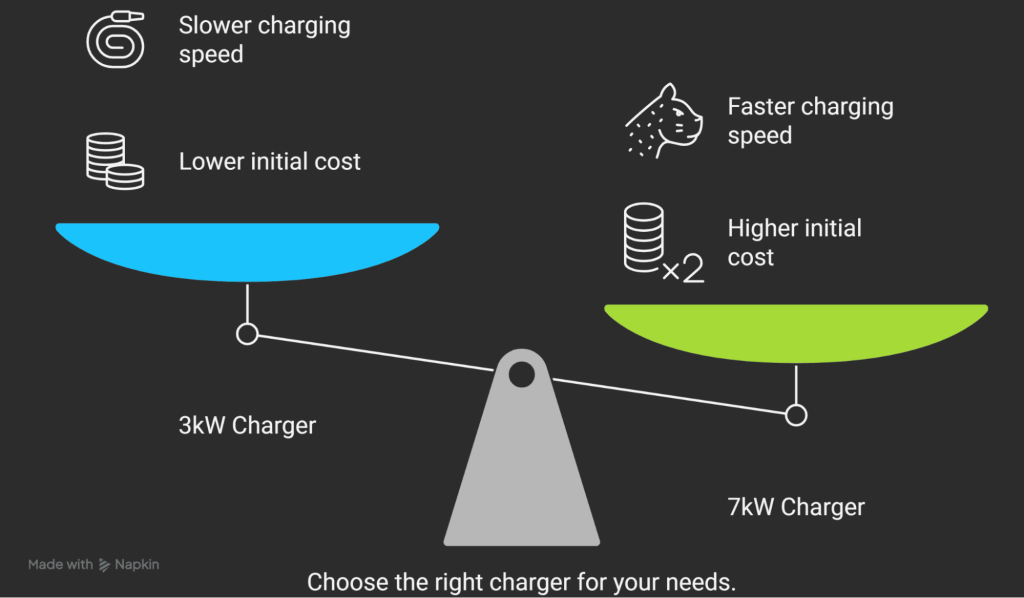
Comparing 3kW and 7kW EV chargers
Additional Costs to Install an Electric Car Charging Point
When budgeting for your EV charger installation, don’t forget these potential additional expenses:
Permitting Fees
While planning permission is generally not required for EV charger installation in London, there are exceptions:
- If you live in a listed building
- If your property is in a conservation area,
- If you need to make significant changes to your property’s exterior
In these cases, you may need to apply for planning permission, which involves additional time and fees.
Electrical Upgrades
Depending on the age and capacity of your home’s electrical system, you might need upgrades before installing an EV charger:
- Replacing or upgrading your fuse box: £350+
- Installing a new isolator switch: £100-£200
- Upgrading to a three-phase power supply (for 22kW chargers): £3,000-£15,000+
Annual Maintenance Costs
Once your electric car charger is installed, ongoing maintenance should be factored into your budget:
- Basic maintenance: Around £90 per year per socket
- Extended warranties: Varies by manufacturer
- Potential repair costs if issues arise outside warranty
Factors Affecting the cost of EV charger installation in London
The final price tag for your EV charging station will depend on various factors specific to your property and needs.
Location and Accessibility for Charger Installation
The physical location where you plan to install the charger can significantly impact costs. For London properties, consider:
- Distance from Your Electrical Panel: The further your desired charging location is from your fuse box, the more wiring will be needed, increasing costs.
- Indoor vs. Outdoor Installation: Outdoor installations require weatherproofing and potentially more complex wiring, which can add to the cost.
- Ground Surface: If trenching is required to run cables underground, costs will vary based on whether you’re digging through soil (£30 per metre) or harder surfaces like concrete.
London’s densely packed housing can present unique challenges. Terraced houses might require creative solutions for cable routing, while flats often need special permissions from building management.
Type of Home Charger for Your Electric Car
As mentioned earlier, the type of charger you choose will significantly affect both the equipment and installation costs:
- 3kW Chargers: The most affordable but slowest option
- 7kW Chargers: The standard choice for most London homes with off-street parking
- 22kW Chargers: Require substantial electrical upgrades beyond what most London homes have
The decision should balance your budget against your charging needs. If you have a long commute and need to recharge quickly each night, a 7kW home charging point might be worth the extra investment compared to a 3kW model.
Electrical System Upgrades for Electric Car Charger Installation
London’s housing stock includes many older properties with electrical systems that weren’t designed with EV charging in mind. Before installation, your electrician will need to assess:
- Whether your current consumer unit can handle the additional load
- If your property has adequate earthing
- Whether you need a new dedicated circuit for the charger
These assessments might reveal the need for electrical upgrades, which can significantly increase your total cost.

London terraced house showing EV charger installation
Alt text: London terraced house showing EV charger installation
Government Grants and Incentives for Home EV Charging
The good news for Londoners is that there are still some financial incentives available to help offset the cost of EV charger installation in London.
Overview of Available Grants for Electric Vehicle Charge
While the Electric Vehicle Homecharge Scheme (EVHS) that previously provided grants for EV chargers in London ended in March 2022, there are still grants available for specific groups:
- The EV chargepoint grant provides up to 75% (maximum £350) towards the cost of purchasing and installing a home charger for:
- People living in flats
- Rental property tenants
- Landlords of rental properties
For workplaces in London, the Workplace Charging Scheme offers grants of up to £350 per socket (maximum 40 sockets per business) for businesses, charities, and public authorities.
How to Apply for Grants to Install an Electric Charger
If you qualify for the EV chargepoint grant, the application process is straightforward:
- Choose an OZEV-approved installer
- The installer will check your eligibility
- If eligible, the installer will apply for the grant on your behalf
- The grant amount (up to £350) will be deducted from your total installation cost
For workplace installations, businesses need to apply directly through the government’s website and receive a voucher before proceeding with installation.
The Installation Process for Electric Car Charging Points
Understanding the installation process can help you better prepare for what to expect when getting an EV charger installed in your London home.
Choosing the Right Location for Your Electric Car Charger at Home
The ideal location for your EV charging station should be:
- Close to where you usually park your car
- Protected from the elements (if possible)
- Accessible without creating trip hazards from cables, public chargers are designed with user safety in mind.
- Within reach of a strong WiFi signal (for smart EV chargers for homes)
In London’s often space-limited properties, finding the optimal location might require some creativity. An experienced installer can help you identify the best spot that balances practicality with installation costs.
Requirements for Installing an EV Charger
Before installation can proceed, you’ll need:
- Off-street parking (chargers cannot be installed if your only parking option is on a public road)
- A suitable wall or post for mounting the charger
- Adequate electrical capacity
- WiFi connection (for smart chargers)
If you live in a flat or rental property, you’ll also need permission from your landlord or building management.
Can I install an electric car charger myself?
While DIY installation might seem like a way to save money, it’s generally not recommended for several reasons:
- Safety concerns with high-voltage electrical work
- Risk of invalidating insurance or home warranties
- Need for proper certification and testing
- Requirement for OZEV-approved installers if applying for government grants
As one London-based electrician put it, “You need to inform the DNO (electricity grid operator in the region) to ensure the main fuse and supply are adequate. It will blow the fuse or start a fire if you do it incorrectly. Because it is a new circuit, you must additionally notify building control under Part P.”
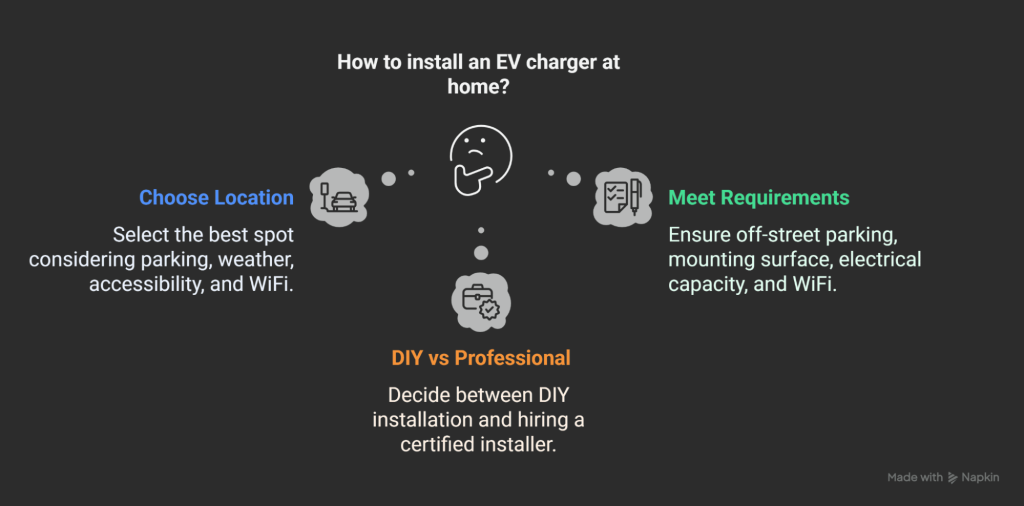
The Installation Process for Electric Car Charging Points
Real-Life Case Study: EV Charger Installation in London
Case Study Overview: Installing a Charger for Your Electric Car
Meet Sarah, a North London homeowner who recently had a 7 kW smart charger installed for her new Nissan Leaf.
Initial Situation:
- Semi-detached house in Islington
- Consumer unit located at the front of the house
- Preferred charger location: side wall of the house near the driveway
The Installation Process:
- Site survey revealed that the consumer unit would need an upgrade to handle the additional load
- Cabling needed to be run from the front of the house to the side wall
- The installation took one day, including the consumer unit upgrade
Total Costs:
- 7 kW smart charger: £650
- Installation (including consumer unit upgrade): £550
- Total: £1,200
Key Takeaways from the Case Study
Sarah’s experience highlights several important lessons:
- The importance of a thorough site survey before committing to installation
- How the location of existing electrical infrastructure can impact costs
- The value of upgrading to a smart charger for better energy management
- The real-world timeframe for a complete installation
She reports saving approximately £40 per month compared to her previous reliance on public charging stations.
Cost-Saving Tips for Charging Your Electric Car
Looking to reduce the cost of EV charger installation in London? Here are some practical tips:
Apply for Government Grants to Charge Your Electric Car
If you’re eligible for the EV chargepoint grant, make sure to take advantage of it. The grant can cover up to 75% of the installation cost (maximum £350), which is a significant saving.
For businesses, the Workplace Charging Scheme can provide substantial savings when installing multiple charging points.
Choose Energy-Efficient Models to Charge an Electric Car
While smart chargers cost more upfront, they can save you money in the long run by
- Automatically scheduling charging during off-peak hours when electricity rates are lower
- Providing data on your energy usage to help you optimize charging habits
- Integrating with home energy management systems
Many energy providers now offer special EV tariffs with significantly reduced overnight rates, which smart chargers can automatically take advantage of.
Leverage Solar Panels for Charging an Electric Vehicle
If you already have solar panels or are considering installing them, integrating them with your EV charger can dramatically reduce the cost of charging:
- During daylight hours, your car can charge directly from solar energy
- With a home battery storage system, you can store solar energy for EV charging at night
- Some smart chargers can automatically prioritize solar power when available
While the upfront investment is higher, the long-term savings and environmental benefits are substantial.
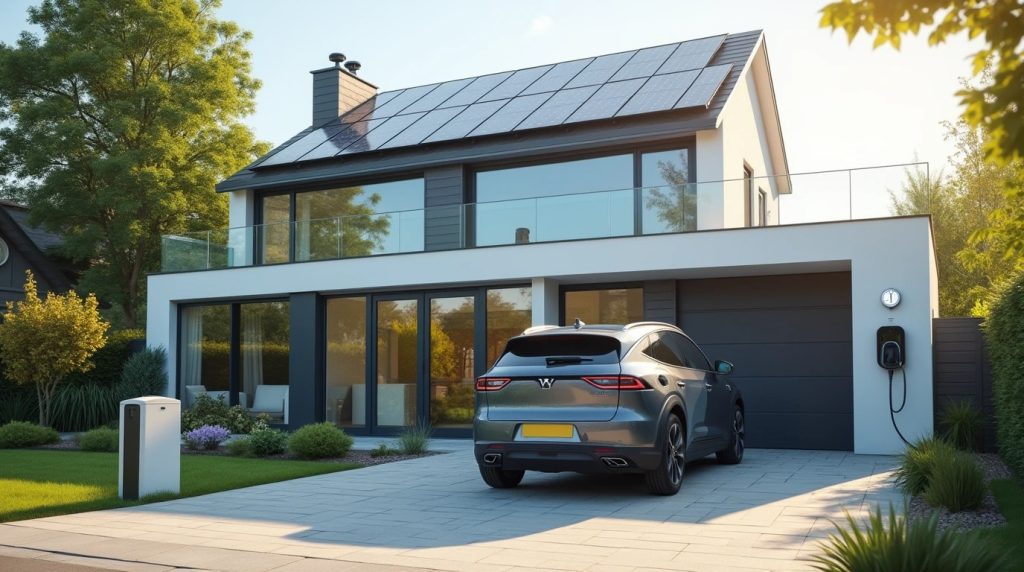
Home EV charging with solar panels and savings
Advanced Topics in Electric Car Charging
For those interested in the more technical aspects of EV charging, here are some advanced concepts that could affect your installation decisions and costs.
What Is Load Balancing and Why Does It Matter for Electric Vehicles?
Load balancing is a smart feature that manages power distribution between your EV charger and other high-demand appliances in your home. This is particularly important in London homes with limited electrical capacity.
Benefits include:
- Preventing circuit overloads and tripped breakers
- Maximizing charging speeds while maintaining household power needs
- Potentially avoiding costly electrical system upgrades
Some advanced chargers include dynamic load balancing as a built-in feature, which can be worth the extra cost if your home is close to its electrical capacity limits.
Vehicle-to-Grid (V2G) Technology Explained for Electric Cars
V2G technology allows electricity to flow both ways between your car and the grid:
- Your car charges from the grid when electricity prices are low
- During peak hours, your car can sell electricity back to the grid
- This can significantly reduce your overall electricity costs
While V2G-ready chargers are more expensive, they may offer substantial long-term savings. However, not all EVs support V2G technology yet, so check compatibility with your vehicle before investing.
Smart Features in Modern Home Chargers
Today’s high-end EV chargers offer a range of smart features that can enhance your charging experience:
- Smartphone apps for remote monitoring and control
- Connectivity to voice assistants such as Google Home or Alexa
- Automatic firmware updates for improved functionality
- Energy usage tracking and reporting
These features typically add £100-£300 to the charger cost but can improve convenience and potentially save money through optimised charging schedules.
Future Trends in Electric Vehicle Charging
The EV charging landscape is rapidly evolving. Here’s what London EV owners might expect in the coming years:
Wireless Charge Points for EVs
Wireless charging technology eliminates the need for cables by using inductive charging pads:
- The car parks over a charging pad installed in the driveway or garage floor
- Electricity transfers wirelessly from the pad to a receiver on the car
- No need to plug in or handle cables in London’s notorious rainy weather
While currently more expensive than traditional chargers, prices are expected to drop as the technology becomes more mainstream.
Ultra-Fast Chargers and Their Installation Costs
While 350 kW ultra-fast chargers are currently limited to commercial installations, smaller but still impressive 50-150 kW home chargers are on the horizon:
- These could reduce charging times to 15-30 minutes for a full charge
- Installation costs would be significantly higher due to electrical requirements
- They may require special agreements with electricity providers
For most London homes, these would require substantial electrical infrastructure upgrades, potentially costing £10,000+.
Predictions for Public Charge Point Infrastructure
London’s public charging network is expanding rapidly, which could affect your decision about home charging:
- By 2025, Transport for London aims to install 50,000 public charging points
- Ultra-Low Emission Zones continue to expand, increasing demand for charging
- Workplace charging is becoming more common, providing daytime charging options
These developments might influence whether you need a higher-capacity home charger or could manage with a more basic installation.
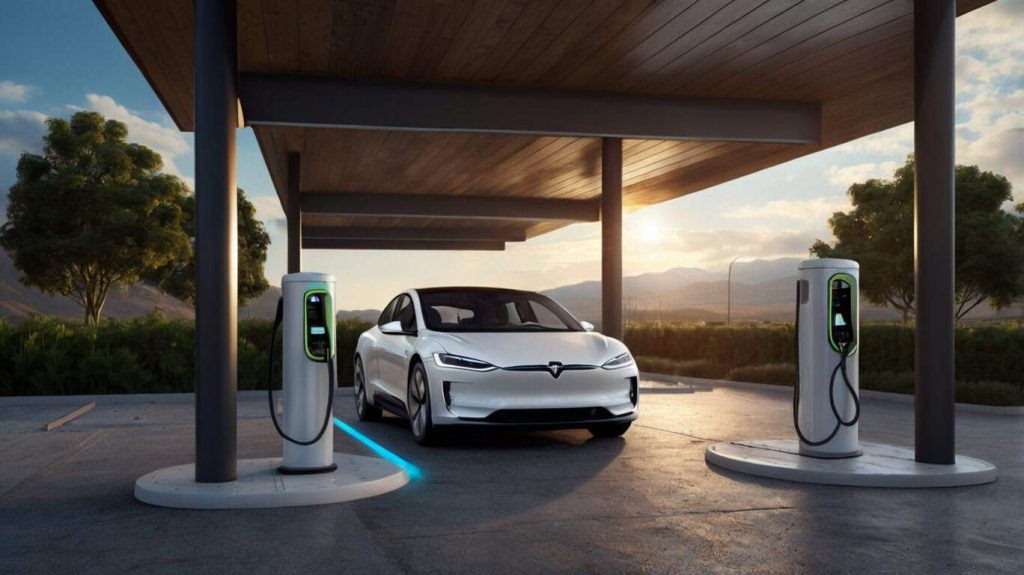
Futuristic EV charging with wireless, fast, sustainable tech
Conclusion
Final Thoughts on Electric Car Charger Installation Costs
Installing an EV charging station in London is an investment that typically costs between £500 and £1,500, depending on your specific circumstances. While this might seem substantial upfront, it’s important to consider:
- The convenience of home charging versus relying on public infrastructure
- Potential savings of £500-£1,000 annually compared to public charging or petrol costs
- The increasing value it adds to your property as EVs become more mainstream
When budgeting for your EV charger installation, remember to account for the charger unit itself, installation fees, potential electrical upgrades, and ongoing maintenance costs.
Why Professional Charger Installation Matters
While it might be tempting to cut corners to save money, professional installation of your EV charger is essential for:
- Safety compliance and reducing fire risks
- Proper integration with your home’s electrical system
- Maintaining manufacturer warranties
- Meeting requirements for insurance coverage
- Ensuring eligibility for government grants
At Moffat Electricals, we specialise in safe, efficient EV charger installations throughout London. Our team of OZEV-approved installers can help you navigate the entire process, from selecting the right charger to applying for available grants and ensuring your installation meets all safety standards.
Ready to power up your London home with an EV charging station? Contact Moffat Electricals today for a free, no-obligation consultation and quote. Our expert team will help you find the most cost-effective charging solution for your specific needs. Don’t wait – join London’s electric revolution and start enjoying the convenience of home charging!
FAQs About Cost to Charge an Electric Vehicle
How Do I Know If My Electric Vehicle at Home is Suitable for an EV Charger Installation?
Most London homes can accommodate an electric car charger installed, but suitability depends on:
- Having off-street parking (mandatory requirement for installing a car charger)
- Your property’s electrical capacity for ev charge points
- The distance between your fuse box and the desired charging point for your home location
A professional site survey is the best way to determine suitability for installing chargers. During this assessment, an electrician will check your current electrical setup and identify any upgrades that might be needed to support your dedicated EV charger.
Can I Use Solar Panels to Power My Charger to Charge Your Car at Home?
Yes! Solar panels can be an excellent way to reduce the cost of a full charge for your new electric car:
- You’ll need a specialized inverter that can direct solar energy to your home ev charger to charge the car
- A battery storage system can help store solar energy for charging your car after sunset
- Some smart chargers can automatically prioritize solar power when available to lower the average cost of electricity
While this setup increases the initial purchase and installation cost, it can dramatically reduce ongoing charging expenses and your carbon footprint, making it a sustainable choice for your new electric vehicle.
What Happens If My Home EV Charger Breaks Down?
If your charging infrastructure malfunctions:
- Check if it’s still under warranty (most come with 2-3 year coverage per charge socket)
- Contact the manufacturer’s support team for troubleshooting your home charger
- If necessary, arrange for a professional repair or replacement to keep your average electric car charging smoothly
Regular maintenance can help prevent breakdowns. Some companies offer service agreements for around £90 per year that include routine checks and priority repair service for your electric vehicle charger.
How Long Does It Take to Charge an EV at Home?
Charging time depends on three factors affecting the cost to charge an electric vehicle:
- Your car’s battery size (typically 40-100 kWh for an average electric car)
- Your charger’s power output (typically 3-7 kW for cost of installing a home charger)
- How empty the battery is when you start charging your car
As a general guide for how much it costs to charge:
- With a 3kW charger: 8-12 hours for a full charge
- With a 7kW charger: 4-6 hours for a full charge
Most EV owners charge overnight when electricity rates are lowest, making the cost of a home charger’s charging time less relevant compared to charging at local public charging stations.
Are There Any Restrictions on Installing an EV Charger in Rental Properties?
For renters in London looking to install a car charger:
- You must get written permission from your landlord to install ev chargers
- The property must have dedicated off-street parking for your electric vehicle at home
- You may be eligible for the electric vehicle chargepoint grant (up to £350) to contribute towards the cost of installing a charger
- Consider portable chargers if permanent ev charger installation isn’t possible when you buy a car
Landlords might be more amenable if you explain that the charging points for businesses or homes could increase the property’s value and that grants are available to offset the average cost of installation.





0 Comments